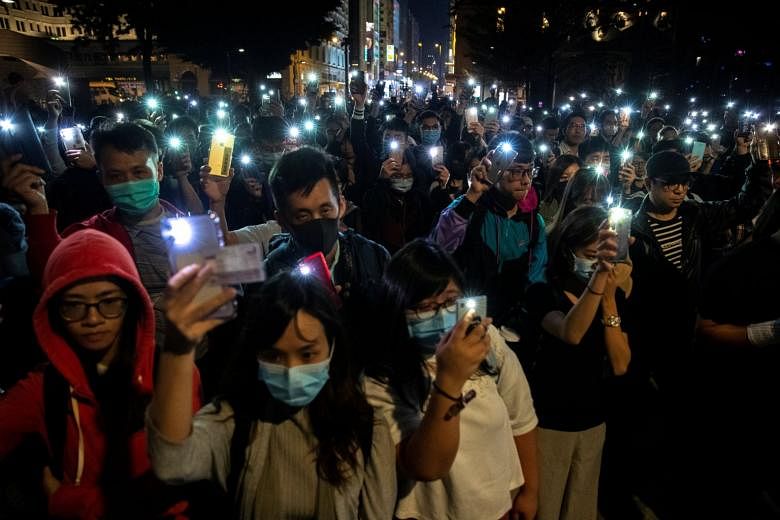HONG KONG - The dramatic surge in violence across Hong Kong could derail the city's district elections this weekend where heavy defeats are expected for the pro-Beijing camp.
Here are four things to know about the 2019 District Council Ordinary Election on Sunday (Nov 24) and the relentless protest movement:
What does a district council do?
The functions of a district council include advising the government on matters affecting the well-being of residents, the adequacy and priorities of government programmes for the district, and the use of public funds allocated to the district for public works and community activities.
There are currently 479 district council members, made up of 452 elected members and 27 ex-officio members who are rural committee chairmen in the New Territories.
A total of 1,090 candidates are jockeying for 452 positions in all 18 district councils, with more than 4.13 million eligible voters.
What's at stake?
District councillors wield little real power. They do not have the authority to pass laws or make decisions on government policies.
But their seats make up a sizeable portion of the committee that selects Hong Kong's chief executive, with the other half picked by the Chinese government.
This is important given protesters are flooding the streets and paralysing the city for demands like the right to nominate and elect leaders of their own choosing, something Beijing has refused.
Enthusiasm has never been higher: This is the first time that there have been competitive races in every seat. In the last decade, voters have mostly favoured the so-called pro-establishment camp, with roughy 68 per cent of local district council positions now held by pro-government politicians compared with just 28 per cent for pro-democracy lawmakers, according to local news organisation HK01.
But opposition politicians are looking to benefit from rising dissatisfaction with the government's performance, which has surged to 80 per cent from 40 per cent a year ago, according to the Hong Kong Public Opinion Research Institute (Pori).
The protest movement
Hong Kong has been reeling from more than five months of unrest triggered by fears that China's central government is stifling the former British colony's special autonomy and freedoms, including its independent judiciary.
The epicentre of the protests recently shifted to the Hong Kong Polytechnic University (PolyU), a stone's throw from the city's harbour, where hardcore protesters repelled riot police with Molotov cocktails, bricks and arrows.
Who are standing?
Pro-establishment parties have been successful in these district council elections. The Democratic Alliance for the Betterment and Progress of Hong Kong (DAB), a Beijing-sponsored party, has been the biggest winner since 2007.
A Pori survey on support for the top 10 political groups gives some idea of how the new political rift may translate into voter intent.
The biggest pro-establishment parties (DAB, the New People's Party and the Federation of Trade Unions) saw their support drop almost 20 per cent within the past year. If this sentiment does guide voters at the polls this weekend, Hong Kong's pro-establishment parties have reason to worry.
Interestingly, support for traditional pan-democratic parties such as the Democratic Party and the Civic Party has remained largely unchanged this past year, while parties that voters perceive to be more radical (Demosisto, People Power) are seeing their support rising.
Pan-democrat district council hopeful, Mr Vincent Lam, has had his candidacy for a seat in the Kowloon City district council confirmed.
Ms Tiffany Yuen, former vice-chairman of Demosisto, a political party co-founded by high-profile democracy activist Joshua Wong, is competing for a seat in Southern district.
But Wong, who faces a charge of inciting protesters to besiege the police headquarters, was last month barred from running.
With contributions from Washington Post, AFP, Bloomberg










